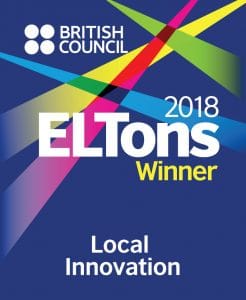EAL Assessment Framework for Schools wins a prestigious British Council ELTons Award 2018
The Bell Foundation is delighted to announce that the EAL Assessment Framework for Schools won the prestigious British Council’s ELTons Awards 2018 Local Innovation category at a ceremony in London on Monday 18 June 2018.

The Bell Foundation is delighted to announce that the EAL Assessment Framework for Schools won the prestigious British Council’s ELTons Awards 2018 Local Innovation category at a ceremony in London on Monday 18 June 2018.
This is a significant achievement as there were 110 national and international submissions to the ELTons this year, of which only 28 finalists were selected. From these an independent judging panel awarded the five category winners.
Winning this award is the culmination of a process which started when the Foundation identified a need for a new and unique, evidence-informed, solution to inform the assessment -both formative and summative- of the proficiency in English of pupils with English as an Additional Language (EAL) and support schools in setting tailored targets for language development to enable these pupils to fully access the curriculum.
The solution, an Assessment Framework, was produced working with a team of top academics and EAL professionals which included Professor Constant Leung of Kings College London; Dr Michael Evans and Dr Yongcan Liu, Faculty of Education at the University of Cambridge; Dr Neil Jones and the EAL team at the Foundation.
“The outcome of this work”, Diana Sutton, Director of The Bell Foundation, said “Is the innovative EAL Assessment Framework, the first and only evidence-informed framework which offers schools an academically robust, curriculum-based, easy-to-use framework for assessing the language proficiency of pupils with English as an Additional Language, designed to support teachers in their planning, and providing practical support strategies and a pupil tracking tool for school staff to monitor and record the progress of EAL learners.”
What makes the Framework unique is the academic rigour with which it was developed and the level of detail in the descriptors themselves that consider both English language proficiency and the curriculum context in which the language will be applied. This makes it relevant to what learners are doing in educational settings and enhances the level of teaching and learning.
Since its launch in 2017, the Framework has been adopted by four Local Education Authorities and downloaded over 6,000 times. One user, an Assistant Vice-Principal, described it as “A phenomenal piece of work by leading experts in the field that does the ‘heavy-lifting’ for schools when it comes to assessing the proficiency of students”.
“The Foundation is developing the Framework and support strategies and providing additional resources to support schools in assessing their EAL learners. This award has reaffirmed the importance of this work.” Diana Sutton confirmed.
Notes to Editors
- The Bell Foundation aims to overcome exclusion through language education by working with partners on innovation, research, training and practical interventions and the Assessment Framework is a perfect example of the outcome of this partnership approach.
- For more information on this award winning Framework please visit the EAL Assessment Framework page
- Media enquiries regarding this announcement should be directed to Julia Shervington, Communications Manager, Julia.Shervington@bell-foundation.org.uk or 01223 275501
- Photos of winners, speakers and the ceremony are available to download, please credit David Lake Photography if used: https://www.flickr.com/photos/teachingenglish/albums/72157698196968585
- You can watch the evening’s events here: http://englishagenda.britishcouncil.org/eltons
- About the ELTons: The ELTons (British Council Innovation Awards) are offered to outstanding new language learning products and services, and aspiring ELT authors, that use innovative ideas to help learners achieve their goals, or to innovative research which has clear practical benefits for English language teaching.
- About the British Council: The British Council is the UK’s international organisation for cultural relations and educational opportunities. The British Council create friendly knowledge and understanding between the people of the UK and other countries. Using the UK’s cultural resources they make a positive contribution to the countries they work with – changing lives by creating opportunities, building connections and engendering trust.The British Council work with over 100 countries across the world in the fields of arts and culture, English language, education and civil society. Each year they reach over 20 million people face-to-face and more than 500 million people online, via broadcasts and publications.Founded in 1934, the British Council are a UK charity governed by Royal Charter and a UK public body. The majority of their income is raised delivering a range of projects and contracts in English teaching and examinations, education and development contracts and from partnerships with public and private organisations. Eighteen per cent of their funding is received from the UK government.